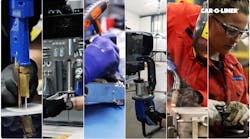State Farm has agreed to an 11th-hour, $250 million settlement in a racketeering class action case that alleges the insurance company paid big money to install a state supreme court justice in Illinois in an effort to overturn what could have been a $1 billion judgement against it in an earlier class action case involving the use of aftermarket parts.
The plaintiffs in this case (Hale et al. v. State Farm et al) claim that the insurance company bought off Justice Lloyd Karmeier by financing his campaign, and that the judge voted in their favor during their appeal of the original class action suit (Avery v. State Farm). By settling, the company avoids a trial where Justice Karmeier may have had to testify, and where it faced the possibility of ponying up $10 billion in damages. The settlement was announced the same day the trial was set to begin.
State Farm denies it acted improperly during the Illinois election. The company referred requests for comment to an official press release, which states:
“Plaintiffs and State Farm have agreed to settle the Hale litigation for $250 million because they believe it is in the best interest of all the parties and to avoid protracted litigation and appeals that could continue for several more years. The settlement provides benefits to the over four million current and former State Farm policyholders who were members of the class in Avery.
“As a part of the settlement, Plaintiffs have agreed to dismiss, upon final approval, their RICO claims and unjust enrichment claims. The settlement agreement will include recitals that State Farm denies liability, that it considers the claims to be without merit, that it considers that it is settling under the unjust enrichment claim, and that the settlement is made simply to bring an end to the entire litigation.”
Calls to plaintiffs attorneys involved in the case were not returned at press time.
A statement from the Alliance of Automotive Service Providers of New Jersey (AASP/NJ) called the settlement a “travesty of justice.”
"It's just how big business works — or insurance companies, in this case. They realize they are in a jam and are willing to throw money at something to protect themselves in the long run, which makes it tough for the smaller businesses like the body shops to compete with the big giants in the industry,” said Jerry McNee, AASP/NJ president. “It's believed that they paid to have this judge put in place; for repayment, he ruled in their favor, and that's something that body shops just don't have any privilege to. It's hard for the body shops to have any traction when they are up against the bullies because they are making all the laws, rules and regulations. Even when they are wrong, they have someone willing to side with them."
The current case and settlement arose out of the Avery v. State Farm class action. In 2001, an intermediate appellate court in Illinois affirmed a $1.06 billion judgment against the company (originally awarded in 1999) as part of a consumer fraud class action case that claimed the insurer refused to pay for OEM repair parts.
State Farm petitioned the state Supreme Court for an appeal in 2003 just as a lengthy, volatile and expensive campaign to fill an open Supreme Court seat was getting underway. The case remained pending throughout the 2004 election, which turned out to be the most expensive state judicial race in U.S. history, with Republican Lloyd Karmeier squaring off against Democrat Gordon Maag. The two spent nearly $10 million during the campaign.
(Maag was a justice on the Fifth District appellate court who wrote the opinion that affirmed the Avery judgment in 2001. In addition to losing the race against Karmeier, Maag also lost his seat on the appellate court in 2004. Maag’s campaign was supported heavily by trial attorneys.)
At the time, it was known that State Farm employees and others involved with the company had directly contributed some $350,000 to the Karmeier campaign. The plaintiffs in the Avery case had asked Karmeier to recuse himself, but he refused. In 2005, the Court overturned the Avery verdict in a 4-2 decision, with Karmeier casting a key vote.
The plaintiff’s attorneys hired a former FBI agent to investigate State Farm's involvement in the election. According to the findings, the insurer may have had a hand in selecting Karmeier for the race, and and may have intentionally obscured its involvement in the campaign.
In fact, the investigation turned up evidence that State Farm had contributed millions to Karmeier’s campaign by giving $2 million to the Illinois Civil Justice League (ICJL) and another $1 million to the U.S. Chamber of Commerce, which in turn gave $20 million to the Illinois Republican Party. The state party then contributed approximately $2 million to Karmeier, while the ICJL's political action committee (JUSTPAC) provided 90 percent of its contributions to the campaign.
The original petition further claimed that State Farm attorney Bill Shepherd was on an Illinois Civil Justice League committee that recruited Karmeier for the race, and may have even selected his campaign manager.
In 2011, the original class asked for the Supreme Court to reconsider the decision based on the investigation. When the Court refused, some of the plaintiffs in the Avery case filed a racketeering class action in federal court, alleging that State Farm and the ICJL had conspired to hide the company’s role in the election and also engaged in mail and wire fraud.
Justice Karmeier, who won re-election in 2014, was deposed in 2015. Earlier in 2018, a federal judge denied State Farm’s motions for summary judgment, which allowed the case to move forward. Karmeier has continued to deny that he knew where the campaign contributions came from. His testimony from the deposition will likely be made public once the settlement is approved.
Prior to the settlement, U.S. District Judge David Herndon had ruled against State Farm several times in the months and weeks leading up to the trial. Herndon had denied five motions from State Farm to exclude experts for the plaintiffs, and seemed to generally favor the plaintiff’s motions over State Farm’s. Ironically, several of those decisions included barring testimony about funds that plaintiff’s counsel, The Clifford Law Firm, had raised for Gordon Maag in the original 2004 election as well as funds contributed to a campaign to unseat Karmeier in 2014.

